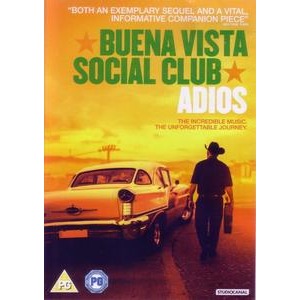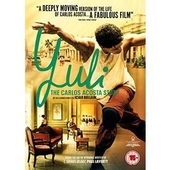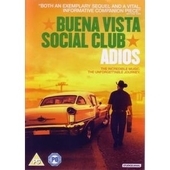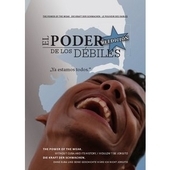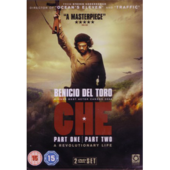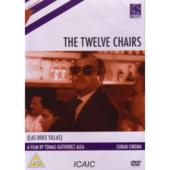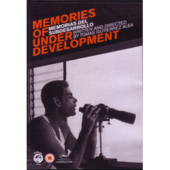DVD: Buena Vista Social Club: Adios
2017, Director Lucy Walker, 106 mins
The captivating follow up film follows the remaining musicians, Omara Portuondo, Eliades Ochoa and others on their final farewell tour around the world, while also looking back at wonderful interviews with those members now gone: Ibrahim Ferrer, Ruben Gonzalez, Compay Segundo.
Read the review below.
Buy the BVSC albums on CD here
£16.00 inc p&p
| Check Basket |
DVD Review: Buena Vista Social Club: Adios
Everybody with a love for Cuban music knows about the phenomenon that was the Buena Vista Social Club. Emerging from a failed project to unite musicians from Cuba and Mali, Sierra Maestra bandleader, Juan de Marcos Gonzalez, was pressed by Nick Gold of World Circuit to chase down whoever was in town in order not to waste precious studio time. The result was a gathering of Cuban allsorts: a country singer from Oriente, a second voice from a famous 1940s trova duo, a successful, hard working diva from the world of filin’ and cabaret, a back up singer from the 60’s, a renowned pianist from the conjunto tradition, a laud player who specialised in old style controversio, a bass master who swung descarga and a phenomenal trumpeter who had played with the best. There was still room for a guitarist from the US (and his son) to come along for the ride. From this seeming disparity, Juan de Marcos and Nick Gold managed to conjure a runaway success, taking the musicians on a fairytale ride to world domination.
The whole project was commemorated in a movie where the dream lived on - the golden age of Cuban music had been shattered by the revolution but the shoeshine boys - and girls - were back and heading for Carnegie Hall. It was true rags to riches.
This follow up film - emerging from a torturous conception - originally intended to document their farewell tour. Such were the problems that it was dramatically pulled from the Sundance festival last year before a re-edit and the final credits now include a non-endorsement from Ry Cooder (the US guitarist who featured so prominently on the album and the first film). However, despite some inconsistencies, what has finally been released is something to treasure and actually is much truer to the whole project than the 1999 movie.
Firstly, the lead voice is that of Juan de Marcos himself, who speaks throughout with authority and knowledge as he guides us through the world of Cuban music and creates a clear context for the artists to tell their amazing and often magical stories. Secondly, fascinating footage of the band recording and rehearsing provides a wonderful insight into the creation of the album and stage show and pulls no punches in revealing how hard the team worked to bring the project to fruition. At one point there is the inevitable clash of egos which provides tension absent in the original film.
Also, the artists themselves make it clear that this was not simply a tale of forgotten musicians. Omara was working constantly with her own band. Eliades Ochoa had his successful Cuarteto Patria. Ibrahim Ferrer had retired as a backing singer to Pacho Alonso and had not gained success as a solo artist. Ruben Gonzalez had been a major player in the late ‘70s as pianist on the Estrellas de Areito album. Compay Segundo had already recorded the eternal ‘Chan Chan’ with Eliades during the ‘80s. These and other stories are told with sincerity, just as much as the world tour success is celebrated.
Another treasure is the use of quality Cuban archive footage - clips from classic 1960s documentaries (sometimes erroneously linked with comments about other decades) are augmented by precious TV footage of the artists in their earlier days. A welcome addition is the credit given to Arsenio Rodriguez, the 1940s artist who virtually singlehandedly invented modern Cuban music.
For those looking for complete performances of the classic songs then the first movie is to be preferred. But for an honest and thoroughly enjoyable retelling of the amazing cultural journey instigated in Havana by Nick Gold and Juan de Marcos, this film is well worth watching.
There are musicians in Cuba who have regretted the whole project believing it hindered the development of other musical styles for a while, as tourists just wanted to hear those songs. However towards the end of the film, Omara Portuondo, that supreme singer, is alone on stage and she tragically sings her famous duet with Ibrahim Ferrer, ‘Dos Gardenias’, as a solo lament. This is high drama and sets the seal of greatness both on this captivating film and the unforgettable Buena Vista Social Club.
Dave Willetts for CubaSi Spring 2018 magazine
